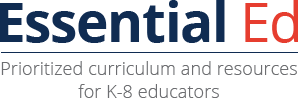Informational and Expository Texts/Research
Unit description: Students will craft a research project that includes information from multiple reliable sources. Throughout their project, students apply their knowledge of identifying and evaluating an author’s argument in informational texts, as well as their ability to determine relevant, sufficient evidence. Students will take part in ample group discussion throughout the entire research process, and will present their findings to their peers.
These learning progressions were developed using Next Generation Learning Standards and were crosswalked with the Common Core Standards.
Essential Outcomes
Reading
- 7R1: Cite textual evidence to support an analysis of what the text says explicitly/implicitly and make logical inferences.
- 7R2: Determine a theme or central idea of a text and analyze its development over the course of the text; summarize a text.
- 7R6: In informational texts, analyze how the author distinguishes his or her position from that of others.
- 7R8: Trace and evaluate the development of an argument and specific claims in a text, assessing whether the reasoning is valid and the evidence is relevant and sufficient and recognizing when irrelevant evidence is introduced.
Language
- 7L3: Use knowledge of language and its conventions when writing, speaking, reading, or listening.
Writing
- 7W1 Write arguments to support claims with clear reasons and relevant evidence, selection, organization, and analysis of relevant content.
- 7W5 Draw evidence from literary or informational texts to support analysis, reflection, and research. Apply the grade 7 Reading Standards to both literary and informational text, where applicable.
- 7W6 Conduct research to answer questions, including self-generated questions, drawing on multiple sources and refocusing the inquiry when appropriate. Generate additional related questions for further research and investigation.
- 7W7: Gather relevant information from multiple sources; assess the credibility and accuracy of each source; quote or paraphrase the data and conclusions of others; avoid plagiarism and follow a standard format for citation.
Speaking and Listening
- 7SL1: Engage effectively in a range of collaborative discussions with diverse partners; express ideas clearly and persuasively, and build on those of others.
- 7SL2: Analyze the central ideas and supporting details presented in diverse formats (e.g., including visual, quantitative, and oral) and explain how the ideas clarify and/or contribute to a topic, text, or issue under study.
- 7SL4: Present claims and findings, emphasizing salient points in a focused, coherent manner with relevant descriptions, facts, details, and examples; use appropriate eye contact, adequate volume, and clear enunciation.
- 7SL5: Include digital media and/or visual displays in presentations to clarify claims and findings and emphasize salient points.
All Standards Addressed in this Unit
- R1, R2, R5, R6, R7, R8, R9
- L3, L6
- W1, W2, W5, W6, W7
- SL1, SL2, SL3, SL4, SL5, SL6
Essential Questions and Big Ideas
- Why is nonfiction important?
- Nonfiction is an important genre because it provides necessary information to its readers.
- Informative and expository texts are two types of nonfiction that can provide us with necessary information on a topic.
- Authors make arguments in nonfiction texts to convey information to the reader. Good readers can identify and track authors’ arguments.
- It’s important to evaluate the legitimacy of nonfiction so that we as readers can make informed decisions based on factual data.
- How do we make research relevant?
- Choosing topics that are important to ourselves and our communities can have a positive impact and spark change.
- We must be informed researchers so we are pulling data and facts from appropriate sources.
- Good researchers have a plan or guide.
- How do we ensure reliable research?
- Some authors have hidden agendas and utilize untruths written as facts to persuade readers. It’s our duty to determine relaitble v. unreliable sources to create a factual research project.
- Research is one way of conveying new information to an audience.
Prerequisite Skills
- Engage effectively in a range of collaborative discussions with diverse partners; express ideas clearly and persuasively, and build on those of others.
- Cite explicit and implicit evidence in a text (informational.)
- Determine a theme or central idea and explain how it is supported by key details; summarize a text.
- Draw evidence from literary or informational texts to respond and support analysis, reflection, and research.
- Conduct research to answer questions, including self-generated questions, drawing on multiple sources and refocusing the inquiry when appropriate.

